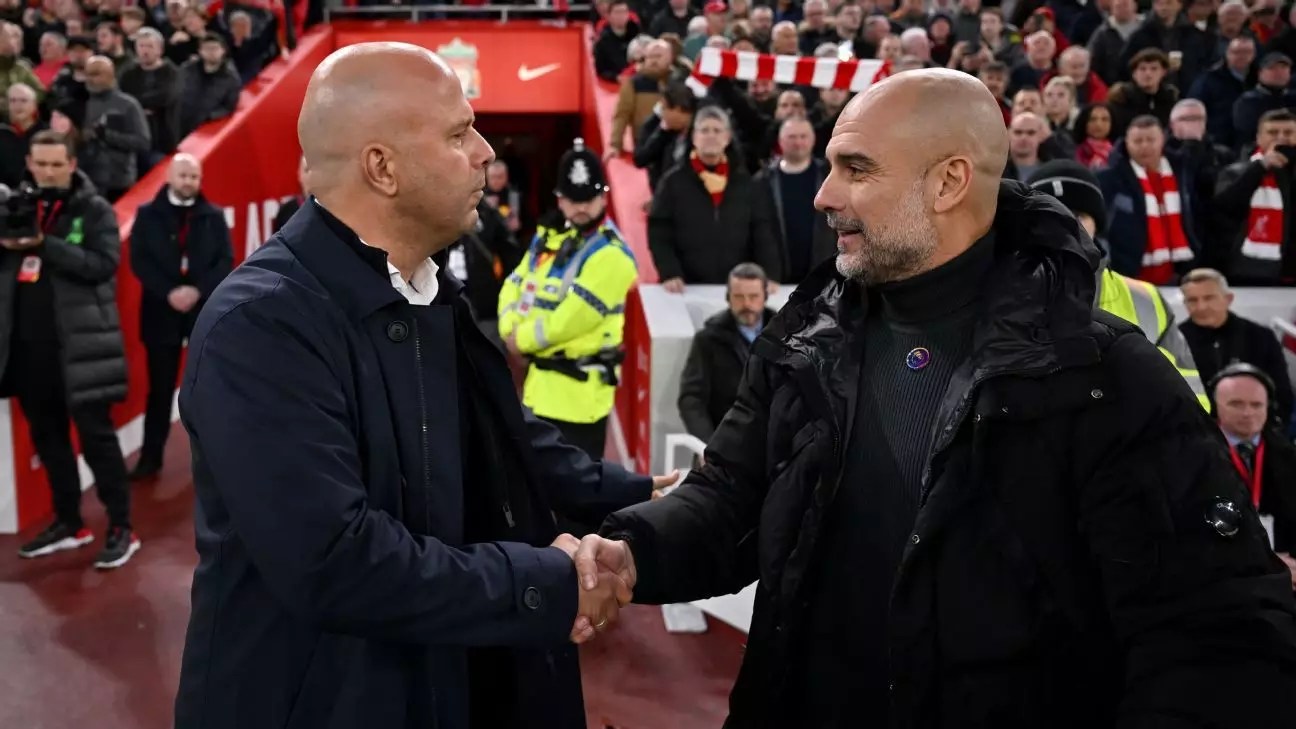In a stunning display at Anfield, Liverpool secured a 2-0 victory over Manchester City, marking Pep Guardiola’s side’s fourth consecutive defeat in the Premier League. This result not only bolstered Liverpool’s position at the top of the table, giving them an 11-point lead ahead of City, but it also highlights a significant shift in the dynamics of the league. Liverpool, currently riding high with a strong performance this season, has been characterized by resilience and tactical discipline, while City finds itself in uncharted territory, struggling to regain its footing in both the league and the Champions League.
Guardiola’s team, now winless in their last seven matches, faces pressures that are foreign to a club of its stature. The current slump mimics a historic low, bringing back memories of August 2008, prior to the transformational takeover by Sheikh Mansour. It begs the question: what has changed in Manchester City, a team previously lauded for its relentless winning mentality?
Arne Slot, Liverpool’s manager, aptly addressed the narrative surrounding Guardiola’s predicament during his post-match conference. He implied that sympathy is misplaced in this scenario, not due to lack of compassion, but rather because of Guardiola’s extensive achievements in football. “No one has to feel sorry for Pep,” Slot asserted. This is a profound observation that resonates within the sports industry; successful managers like Guardiola have amassed accolades and expertise, crafting legacies that allow for a series of setbacks without eliciting widespread concern.
Such perspectives challenge the typical narrative surrounding managerial crises. While empathy is often reserved for those facing prolonged failures, it is vital to analyze the context of those failures. Guardiola, having led Manchester City to multiple Premier League titles, is equipped with the experience needed to navigate adversity. His historical ability to bounce back, evidenced by a dramatic turnaround last season when City trailed Arsenal by eight points, demonstrates resilience.
Maintaining Momentum Amidst Adversity
For Liverpool, the victory over City follows an exhilarating win against Real Madrid, indicating that slot’s side is not just performing well but establishing a winning culture. However, Slot remains cautious, emphasizing that victory against top-tier teams should not lead to complacency. His focus on consistency underscores the essence of sustained success; winning against formidable opponents is commendable, yet it ultimately requires a streak of victories to convert such successes into tangible honors by the season’s end.
“As much as we celebrated wins against teams with rich histories and trophies, football is about more than sporadic victories,” Slot remarked. The reference to rivals such as Arsenal and Chelsea suggests that Liverpool must remain vigilant; the competition is fierce, and one or two strong performances do not guarantee silverware.
Injury Concerns and Strategic Depth
One of the critical elements concerning Liverpool’s campaign will be player fitness—especially given the injuries to key defenders like Ibrahima Konaté and Conor Bradley. Slot’s awareness of maintaining squad depth amid injury setbacks is crucial for their title aspirations. The manager has implored the necessity of keeping his remaining players fit, articulating the impact injuries can have on a season.
By utilizing substitutes effectively, as seen with Alexander-Arnold’s early withdrawal, Slot demonstrates an understanding of the physical demands placed upon his side. This strategic management of player fitness is essential as Liverpool seeks to balance domestic responsibilities with the rigors of European competition, all while warding off the threats posed by an ever-improving list of challengers.
Ultimately, Liverpool’s ability to navigate this pivotal period will define their title aspirations and the legacy of Slot’s management. The psychological aspect of football remains paramount; how the squad reacts to pressure, injury setbacks, and the challenge of maintaining their form through the season will be the deciding factor. Guardiola faces a different kind of pressure—a necessity to recover from one of the worst slumps in his managerial career while rallying his team to rediscover their championship-winning formula.
In a league characterized by unpredictability, Slot’s careful approach, combined with Guardiola’s rich history of overcoming adversity, sets the stage for an intriguing second half of the season. The question remains: can Liverpool maintain their momentum while Manchester City find their way back to form? The forthcoming matches will be instrumental in answering this critical question, shaping the narrative of this Premier League campaign.


Leave a Reply